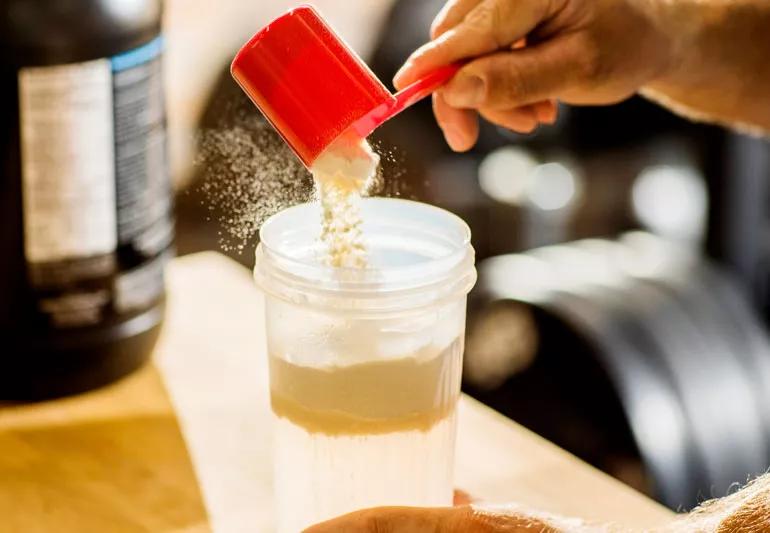Learn about the benefits and risks of this popular protein supplement

Image content: This image is available to view online.
View image online (https://assets.clevelandclinic.org/transform/d7abfece-049b-49cd-8956-3a9daa8910ed/wheyProtein-875443812-770x533-1_jpg)
mixing a whey protein shake
Little Miss Muffet may have been well ahead of her time. She was eating curds and whey before whey protein was a thing. Today, whey protein is an ingredient in many nutritional bars and shakes.
Advertisement
Cleveland Clinic is a non-profit academic medical center. Advertising on our site helps support our mission. We do not endorse non-Cleveland Clinic products or services. Policy
Registered dietitian Maxine Smith, RD, LD, explains the pros and cons of whey protein and whether you need this supplement in your life.
Whey protein refers to a group of eight proteins found in milk. These proteins, in order from the biggest to smallest amounts in milk, are:
Manufacturers add enzymes to milk in the cheese-making process. The enzymes curdle the milk, which separates the liquid whey from milk’s solid curds. The curds, which contain most of the milk’s fat, are the main ingredient in cheese.
When the solid curds are removed, you’re left with watery whey protein, which has varying amounts of lactose (milk sugar) and fat. Usually, manufacturers pasteurize the whey to kill bacteria and then dry it. Voila! Whey protein powder.
Whey protein then undergoes another process to make one of three main types:
Advertisement
Whey protein is a complete protein, containing all nine essential amino acids. “Amino acids are important for many functions in the body, from building muscle to creating new immune cells,” says Smith.
Your body makes many amino acids on its own, but not essential amino acids. You have to get essential amino acids through your diet, and consuming whey protein is one way to do that.
But don’t discount “incomplete” proteins. Most plant proteins, like legumes and nuts, don’t contain all the essential amino acids. But they have plenty of health benefits. When you eat a variety of incomplete proteins, you get more than enough essential amino acids to meet your body’s needs.
Whey protein may be useful for:
Whey protein is generally safe for most people to take, as long as they don’t have a dairy allergy. But there are some drawbacks:
Advertisement
Whey protein has its place if you’re an athlete building muscle or trying to fill some nutritional gaps. But most people already get enough protein and don’t need supplements.
“Your body can only use 20 to 40 grams of protein at a time,” Smith says. “Even if you’re trying to bulk up, taking amounts higher than this isn’t helpful. Most people don’t need whey protein to meet their protein requirements if they’re eating a healthy diet.”
As with any supplement, it’s best to discuss with your physician before you start taking protein supplements. They can interfere with some medications or may actually be harmful for people with certain conditions.
Advertisement

Sign up for our Health Essentials emails for expert guidance on nutrition, fitness, sleep, skin care and more.
Learn more about our editorial process.
Advertisement
Certain supplements, like licorice root and St. John’s wort, can raise your blood pressure or negatively interact with medication
Properly prepared, elderberries can be a safe and healthy part of a balanced diet — just steer clear of supplements
Science doesn’t support most claims about this bee byproduct, and supplements have potential risks
The meat-based elimination diet restricts important food groups — like fruits and vegetables — that keep you healthy
Eat your fill of vitamins C, B6 and E, plus zinc and selenium
The vitamins, minerals and other nutrients in the food you eat are essential for a healthy heart, but supplements are another story
Early research shows that this supplement may help, but more studies are needed
The natural supplement may help with weight loss, lower blood sugar and protect your heart
Although it could be used as a moisturizer, this new trend is not recommended
Communicating clear limits helps protect your time, energy and emotional well-being
High cholesterol can be genetic, but testing and treatment can lower your heart disease risk